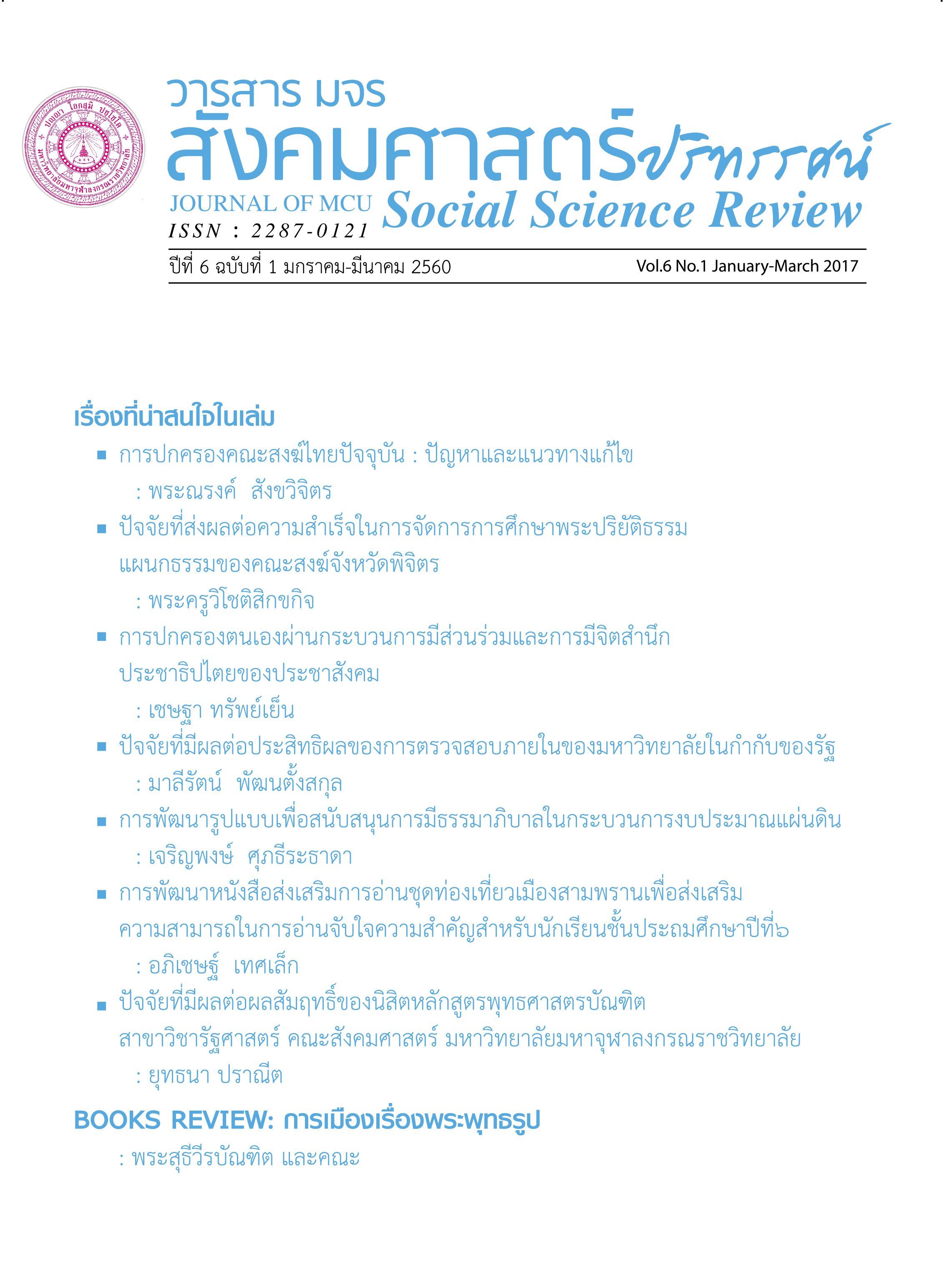การปกครองตนเองผ่านกระบวนการมีส่วนร่วมและการมีจิตสานึกประชาธิปไตย ของประชาสังคม
คำสำคัญ:
การปกครองตนเอง กระบวนการมีส่วนร่วม จิตสานึกประชาธิปไตยบทคัดย่อ
บทความวิจัยนี้ศึกษาถึงปัจจัยที่นาไปสู่การปกครองตนเอง และปัจจัยดังกล่าวประกอบกันเป็นความสัมพันธ์กันอย่างไรที่นาไปสู่ตัวแบบการปกครองตนเอง โดยการวิเคราะห์ตัวแบบสมการเชิงโครงสร้างที่ประกอบด้วยตัวแปรแฝง คือ การปกครองตนเอง ประชาธิปไตยแบบมีส่วนร่วม จิตสานึกประชาธิปไตย และบริบทสภาพแวดล้อม ด้วยจานวนตัวอย่าง 330 ตัวอย่าง จากการสุ่มแบบกลุ่มที่เป็นครัวเรือนจากทุกตาบลในจังหวัดสมุทรสงคราม ผลการวิจัยพบว่าตัวแบบการปกครองตนเองผ่านกระบวนการมีส่วนร่วมและการมีจิตสานึกประชาธิปไตยของประชาสังคมจังหวัดสมุทรสงครามมีความสอดคล้องกลมกลืนกับข้อมูลเชิงประจักษ์ และยอมรับสมมติฐานทุกข้อ คือ 1) บริบทของสภาพแวดล้อมส่งผลเชิงบวกต่อการมีจิตสานึกประชาธิปไตย 2) บริบทของสภาพแวดล้อมส่งผลเชิงบวกต่อประชาธิปไตยแบบมีส่วนร่วม 3) จิตสานึกประชาธิปไตยส่งผลเชิงบวกต่อประชาธิปไตยแบบมีส่วนร่วม 4) จิตสานึกประชาธิปไตยส่งผลเชิงบวกต่อการปกครองตนเอง 5) ประชาธิปไตยแบบมีส่วนร่วมส่งผลเชิงบวกต่อการปกครองตนเองในระดับมาก
เอกสารอ้างอิง
Barber, B. R. (2003). Strong Democracy : Participatory Politics for a New Age. Los Angeles: University of California Press. Eriksson, L. (2009). Self - Governance in Micro Level Theory. In E. Sørensen & P.Triantafillou (Eds.). The Politics of Self -Governance. Surrey : Ashgate Publishing Limited. Keating, M. (2009). The Independence of Scotland Self-Government and The Shifting Politics of Union. New York: Oxford University Press. Narong Sinsawat. (2552). Political Psychology. (2rdedition). Bangkok: Tammasart University Press. Narumol Tabjumpol. (2551). Argument about Democracy From The View of The Powerless Group, in Narong Petprasert : Not beyond Popularism, Democracy Seeking. Bangkok: Adison Press Product. Poramot Wanbawon. (2559). Creating Political Culture Whith Citizen for Democratic Regime. Journal of MCU Social Science Review, 5(3), 255 – 270. Przeworski, A. (2010). Democracy and The Limits of Self-Government. Cambridge: Cambridge University Press. Sombat Tamrongtanyawongs. (2537). Politics: Concept and Development. Bangkok: S and G Graffics. Turner, M. (2005). From Centralized Authoritarianism to Decentralized Democracy : Regional Autonomy and The State in Indonesia. In M. Weller & S. Wolff (Eds.), Autonomy, Self - Governance and Conflict Resolution Innovative Approaches to Institutional Design in Divided Societies. New York: Routledge. Wolff, S., & Weller, M. (2005). Self - Determination and Autonomy : A Conceptual Introduction. In M. Weller & S. Wolff (Eds.), Autonomy, Self - Governance and Conflict Resolution : Innovative Approaches to Institutional Design in Divided Societies. New York: Routledge.
ดาวน์โหลด
เผยแพร่แล้ว
รูปแบบการอ้างอิง
ฉบับ
ประเภทบทความ
สัญญาอนุญาต
ลิขสิทธิ์ (c) 2018 วารสาร มจร สังคมศาสตร์ปริทรรศน์

อนุญาตภายใต้เงื่อนไข Creative Commons Attribution-NonCommercial-NoDerivatives 4.0 International License.
เพื่อให้เป็นไปตามกฎหมายลิขสิทธิ์ ผู้นิพนธ์ทุกท่านต้องลงลายมือชื่อในแบบฟอร์มใบมอบลิขสิทธิ์บทความให้แก่วารสารฯ พร้อมกับบทความต้นฉบับที่ได้แก้ไขครั้งสุดท้าย นอกจากนี้ ผู้นิพนธ์ทุกท่านต้องยืนยันว่าบทความต้นฉบับที่ส่งมาตีพิมพ์นั้น ได้ส่งมาตีพิมพ์เฉพาะในวารสาร มจร สังคมศาสตร์ปริทรรศน์ เพียงแห่งเดียวเท่านั้น หากมีการใช้ภาพหรือตารางหรือเนื้อหาอื่นๆ ของผู้นิพนธ์อื่นที่ปรากฏในสิ่งตีพิมพ์อื่นมาแล้ว ผู้นิพนธ์ต้องขออนุญาตเจ้าของลิขสิทธิ์ก่อน พร้อมทั้งแสดงหนังสือที่ได้รับการยินยอมต่อบรรณาธิการ ก่อนที่บทความจะได้รับการตีพิมพ์ หากไม่เป็นไปตามข้อกำหนดเบื้องต้น ทางวารสารจะถอดบทความของท่านออกโดยไม่มีข้อยกเว้นใดๆ ทั้งสิ้น





